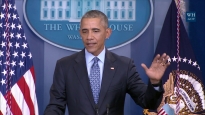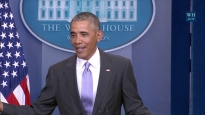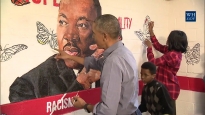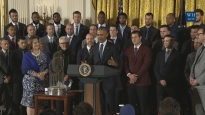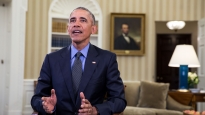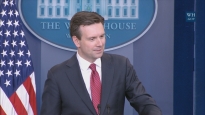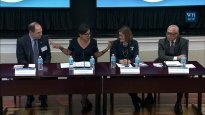President Obama Speaks at the National Prayer Breakfast
February 07, 2013 | 18:03 | Public Domain
President Obama delivers remarks at the 2013 National Prayer Breakfast.
Remarks by the President at House Democratic Issues Conference
Lansdowne Resort
Leesburg, Virginia
12:49 P.M. EST
THE PRESIDENT: Thank you! (Applause.) Thank you, everybody. Please have a seat. Xavier, thank you for that very gracious introduction and your outstanding leadership.
Let me begin by saying that I could not be happier that one of my most important friends and partners is still leading our Democrats in the House of Representatives. I love Nancy Pelosi. Give her a big round of applause. (Applause.) Love Nancy Pelosi. (Applause.) Also, she just generates good-looking grandbabies. (Laughter.) They're all so handsome and sharp and beautiful.
To Steny Hoyer and Jim Clyburn, as well as Xavier and Joe Crowley, thank you so much for the great work that you guys are doing each and every day. And to Steve Israel, who worked tirelessly to bring on 49 new outstanding members of this caucus. (Applause.) I am looking forward to spending time with all 49 of you. And hopefully we'll be seeing you over at the White House and at various events, but obviously I know that you came here to get something done. And I am looking forward to working with you every single day to make sure that we're doing right by the people who sent us here.
Now, I actually just changed the format here. I called an audible -- because originally the way this was scheduled was I was just going to talk and then I was going to shake some hands, and I thought, since this is not a shy bunch, it might make sense for me to take some questions and some advice I'm sure you guys have for me. (Laughter.) So what I'm going to do is I'm just going to make s few points at the top, and then what I'd like is maybe Xavier or Steve or somebody can come up here, you can call on folks, and we'll spend a little time with Q&A before I get a chance to say hello to everybody.
And part of the reason I want to keep my remarks short is because I just made a pretty long speech a couple of weeks ago, and I'm about to make another next week, and I don’t want you guys tired of me. (Laughter.)
But, obviously, I'm deeply grateful to have been reelected, and I'm humbled by the support that I received from all across the country. (Applause.) And I said at the National Prayer Breakfast this morning -- and I was telling the truth -- I genuinely am humbled. The fascinating thing about this job is the longer you're in it, the more humble you get, and the more you recognize your own imperfections. And you try to make up with effort and hard work those gaps in your personality or your intelligence that become so apparent to everybody on the daily news every day. (Laughter.)
But even as I think it’s important to be humbled by the privilege of this office and the privilege of serving in the United States Congress, even as it’s important not to read too much into any particular political victory -- because this country is big, it is diverse, it is contentious, and we don’t have a monopoly on wisdom, and we need to remember that -- despite all those things, I think it’s also important for us to feel confident and bold about the values we care about and what we stand for.
And I tried to do that in my inauguration speech, and I’m hoping that we all do that over the next four years. Because when I think about what it means to be a Democrat in this day and age, I start with the basic proposition that we are all created equal, that we’re all endowed by our Creator with certain inalienable rights. And my governing philosophy and my interest in public service grows out of how we make that union more perfect for more people, day in, day out.
And that starts with an economy that works for everybody. Throughout my campaign, and throughout many of your campaigns, we talked about this bedrock notion that our economy succeeds and our economy grows when everybody is getting a fair shot and everybody is getting a fair shake and everybody is playing by the same rules. That we have an economy in which we’re growing a vibrant middle class -- that it grows from the middle out and the bottom up, not from the top down.
And over the next four years as I work with this caucus and every caucus, the question I will ask myself on every item, every issue is, is this helping to make sure that everybody has got a fair shot and everybody is doing their fair share, and everybody is playing by the same rules. Because I believe that is a growth agenda -- not just an equity agenda, not just a fairness agenda -- that is a growth agenda. That is when we have grown fastest.
And that means that what you’ll hear from me next week, I’m going to be talking about making sure that we’re focused on job creation here in the United States of America. (Applause.) It means that we’re focused on education and that every young person is equipped with the skills they need to compete in the 21st century. (Applause.) It means that we’ve got an energy agenda that can make us less dependent on foreign oil, but also that we’re cultivating the kind of clean energy strategy that will maintain our leadership well into the future.
It means that we’re going to talk about, yes, deficits and taxes and sequesters and potential government shutdowns and debt ceiling -- we’ll talk about that stuff, but all from the perspective of how are we making sure that somebody who works hard in this country -- a cop, or a teacher, or a construction worker, or a receptionist -- that they can make it if they work hard, and that their kids can make it and dream even bigger dreams than they have achieved.
And obviously a lot of what we’ll be working on initially over the next few weeks is going to be on how do we deal with the sequester issue. And I just want to make this quick point. I had a press conference this week in which I reiterated I am prepared, eager, and anxious to do a big deal, a big package that ends this “governance by crisis” -- (applause) -- where every two weeks or every two months or every six months, we are threatening this hard-won recovery -- where finally housing is starting to pick up, and commercial real estate is starting to do better, and the unemployment numbers are still too high, but we’re seeing some job growth, and businesses are investing and manufacturing is doing well -- and we continue to have these self-inflicted crises here in Washington that suddenly leads everybody to tap the brakes.
And so what I said this week was I want to do something big to provide certainty and steadiness for the economy and for American families. And that means a balanced package that will reduce our long-term deficit and debt, but that still allows us to invest in those things that we need to grow right now -- (applause) -- because that's also a deficit reduction agenda, us growing faster.
And in order to have a balanced package, that means that -- we’ve already done a lot of cuts. We’ve done some revenue now. And so the rest of the way moving forward, we can do some additional reforms, and make our health care programs work better and make them more efficient, and we can cut our programs that we don't need. But it also means that we’ve got to be able to close some tax loopholes and deductions that the average American cannot take advantage of, to raise the revenue to actually do the job in a way that allows us to continue to grow. (Applause.)
Now, the reason this is relevant is because I gather -- and I haven’t gotten this from firsthand sources, but from secondhand sources in the press -- that our friends on the other side of the aisle, their position is: We’re concerned about the sequester. We recognize that just cutting the federal spending with a meat ax, as opposed to scalpel is probably damaging -- it will damage our national security; it will damage our educational system. We'll have kids getting kicked off of Head Start. It will mean people who have disabled kids suddenly having less help.
They recognize that the sequester is a bad idea, but what they’ve suggested is that the only way to replace it now is for us to cut Social Security, cut Medicare, and not close a single loophole, not raise any additional revenue from the wealthiest Americans or corporations who have a lot of lawyers and accountants who are able to maneuver and manage and work and game the system.
And I have to tell you, if that's an argument that they want to have before the court of public opinion, that is an argument I'm more than willing to engage in. (Applause.) Because I believe the American people understand that, yes, we need to reduce the deficit, but it shouldn’t just be on the backs of seniors; it shouldn’t just be on the backs of young people who are trying to get a college education; it should not just be on the backs of parents who are trying to give their kids a better start in life; that all of us have to participate -- and that if, in fact, it’s important for us to make sure we've got a strong national defense and that we reduce our spending in a smart way, we sure as heck should be willing to ask those of us who are luckiest in this society to close a few loopholes and deductions that the average American doesn’t get.
And if that's the choice that we've got, I promise you we can win that debate because we're on the right side of this argument. And I expect that you guys will be with me on that. (Applause.)
Last point I'll make -- obviously economic growth is a priority. But making sure that we're opening up opportunity for everybody is also important. And that's why immigration reform is so critical. (Applause.) I said this is going to be a top priority and an early priority of my administration. I am heartened to see Republicans and Democrats starting to be in a serious conversation about getting this done. Now is the time.
I recognize that the politics aren't always easy. There are regional variations. I understand that in some places this may end up being a tough issue. But what I also know is that part of our strength is our youth and our dynamism, and our history for attracting talent from all around the globe. And I've seen that talent in some of the young DREAMers that I've met who want to serve in our military, want to get an engineering degree, want to help build this country, want to start a business. And I want to make sure that that American future is secured.
So we need to get immigration reform done. And I'm going to be pushing hard to get it done early. (Applause.)
And we're also going to have to make sure that we keep the American people safe, which means that we're going to continue to work, even as we draw down our troops in Afghanistan, to go after those who would attack America.
And we've got to be mindful about steps we can take to end the cycle of gun violence in this country. And we should do so -- (applause) -- recognizing that, again, there are regional differences here and we should respect those, and guns mean something different for somebody who grew up on a farm in a rural community than somebody who grew up in an inner city and they’re different realities and we have to respect them. But what we know is the majority of responsible gun owners recognize we cannot have a situation in which 20 more of our children, or a 100 more of our children, or a 1,000 more of our children are shot and killed in a senseless fashion, and that there are some common-sense steps that we can take and build a consensus around. And we cannot shy away from taking those steps.
So the bottom line is this, people -- we've got a lot of work to do. What we've learned over the last four years -- at least what I've learned over the last four years -- is that it won't be smooth; it won't be simple. There will be frustrations. There will be times when you guys are mad at me -- (laughter) -- and I'll occasionally read about it. But as long as we keep in mind why we came here in the first place; as long as we think back to whatever inspired each of us to say, maybe I can give something back, maybe I can make a difference, maybe my purpose here on Earth is not just thinking about what's in it for me, but thinking about what's in it for the broader community -- for my neighborhood, for my state, for my country -- if we keep that in mind every single day, I have no doubt that we will continue the extraordinary progress that we've made already.
And as a byproduct of doing that good work and keeping that focus, I would expect that Nancy Pelosi is going to be Speaker again pretty soon. (Applause.)
All right? So thank you very much, everybody. God bless you. Thank you. (Applause.)
END
1:12 P.M. EST
|
January 18, 2017
|
January 17, 2017
|
January 16, 2017
|
January 16, 2017
|
|
January 14, 2017
|
January 13, 2017
|
January 13, 2017
|
January 12, 2017
|
